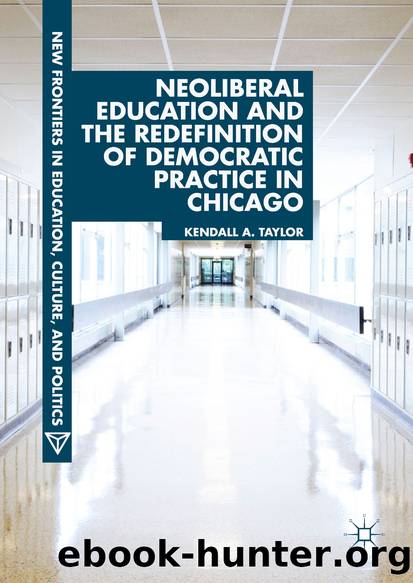Neoliberal Education and the Redefinition of Democratic Practice in Chicago by Kendall A. Taylor

Author:Kendall A. Taylor
Language: eng
Format: epub
ISBN: 9783319989501
Publisher: Springer International Publishing
4.5 Bilingual Hegemony
As with the Chicago strike, all too often, the language used by national education reformers is the same as that used by those who struggle against education reform. The same forces which want to ensure the privatization of education through charter schools, school closings , punitive accountability measures, increased testing and truncated curriculums, and de facto segregation of opportunity use phrases like “put the children first” or “students are our top priority” or “put democracy back in education”. As I argued in Chapter 1, the outcomes of these policy interventions are anti-democratic in nature and are harmful to the very students they purport to aid. In response, those opposed to the current direction of neoliberal education reform use these same phrases to contest these same policies.
This apparent contradiction could be understood as a crass attempt to co-opt the language of dissenters, thereby weakening their argument, or as an attempt to confuse the larger population through the use of misleading words. Indeed, this is the case. However, this is also an excellent example of struggles over the discourse of hegemony on a large scale. In the case of the Chicago strike, the teachers and union sought to decouple words and concepts from the current rationality, thereby bringing a different process of signification to bear. The same thing is happening here. By using the same phrases as those who are antagonistic toward them, the proponents of education reform are actively working to redirect the signification of phrases such that, rather than signal opposition, they evoke the larger discursive matrix of neoliberalism .
The fact that these phrases and concepts are still in flux, that they are still the target of contestation, lends a bilingual quality to the debates and struggles over education in the United States. There is a lot of talking but little common understanding. The same textual elements are signifying vastly divergent ways of organizing society and ensuring educational provision. Ironically, this has the effect of both limiting the power of language and making it a central component of struggle at the same time. Language is limited because as its ability to signify is altered, it loses some of its ability to explain, evoke, and bring people together in common understanding. Its importance is expanded because the solidifying the signs toward which language points constructs the discursive field on which struggles over education are fought.
Download
This site does not store any files on its server. We only index and link to content provided by other sites. Please contact the content providers to delete copyright contents if any and email us, we'll remove relevant links or contents immediately.
The Art of Coaching Workbook by Elena Aguilar(51160)
Trainspotting by Irvine Welsh(21643)
Twilight of the Idols With the Antichrist and Ecce Homo by Friedrich Nietzsche(18622)
Fangirl by Rainbow Rowell(9228)
Periodization Training for Sports by Tudor Bompa(8253)
Change Your Questions, Change Your Life by Marilee Adams(7759)
This Is How You Lose Her by Junot Diaz(6877)
Asking the Right Questions: A Guide to Critical Thinking by M. Neil Browne & Stuart M. Keeley(5758)
Grit by Angela Duckworth(5604)
Red Sparrow by Jason Matthews(5467)
Paper Towns by Green John(5177)
Room 212 by Kate Stewart(5105)
Ken Follett - World without end by Ken Follett(4723)
Housekeeping by Marilynne Robinson(4436)
The Sports Rules Book by Human Kinetics(4379)
Papillon (English) by Henri Charrière(4262)
Double Down (Diary of a Wimpy Kid Book 11) by Jeff Kinney(4261)
The Motorcycle Diaries by Ernesto Che Guevara(4089)
Exercise Technique Manual for Resistance Training by National Strength & Conditioning Association(4061)
